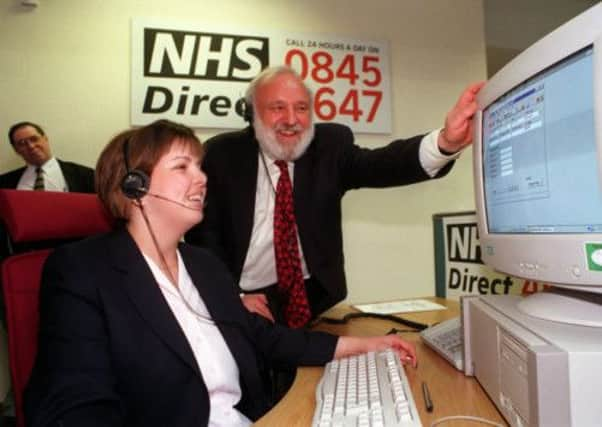Frank Dobson: An NHS success destroyed by this Government


I must declare an interest – a sort of proprietorial one – because I was Health Secretary when we decided to set up NHS Direct in 1998. We set it up in a sensible way, and it worked from the start. We established three pilot schemes. The service was gradually rolled out across the country, learning all the time from the experiences of the earlier services that were already working.
It worked well from the start, and there is no excuse for Ministers in this Government who have introduced the 111 service as a mess. They have been calling summits and announcing reviews ever since it started going wrong. That is pathetic, because they are not in the Department of summits and reviews; they are in the Department of Health.
Advertisement
Hide AdAdvertisement
Hide AdThose Ministers were not even doing anything new. They had the opportunity to build on NHS Direct, which was a successful example. In 2002, it was described as a remarkably successful service by the Public Accounts Committee, and of which the current Chancellor of the Exchequer (George Osborne) was a very active member. Reports said it had met all its deadlines and properly addressed all the risks, and that it had a practical approach and had learned lessons as it went along. It was also commended for the fact that its computer procurement had been well managed and had been delivered to cost, and that there had been satisfactory consultation and it was clinically safe.
It was praised, too, for reducing demand on other parts of the NHS. The main reason it was reducing demand was because it was predominantly staffed by nurses, who had the professional confidence and judgment simply to offer reassurance to some who got in touch. In the current service, however, there are many call handlers, who do not have that professional knowledge and confidence, and are therefore referring people to GP services or A&E and are arranging ambulances.
I commend the views of the PAC back in 2002. It was far sighted, because it said: “Departments should consider what wider lessons they could learn from the successful introduction of this significant and innovative service on time.”
The Chancellor’s Government have clearly decided to ignore that recommendation. The PAC also noted: “Short lines of communication between the Project Team and those implementing the service at local level enabled lessons to be learnt quickly as the projects progressed.”
Advertisement
Hide AdAdvertisement
Hide AdClearly the current Government did not learn that lesson either. The current Chancellor himself said in one of his contributions to the committee: “My concern is that the Permanent Secretary… is going to start saying, we are great, we have this giant switchboard for the NHS, and your service is going to lose the focus of its original function.”
That perfectly describes what has happened with the abolition of NHS Direct and its replacement by the 111 service. The 111 service does not have short lines of communication – indeed, I doubt whether it has any at all. It has also taken on innumerable new functions, and has been expected to carry them out at less cost than NHS Direct was operating at.
The only way it could reduce costs was by getting rid of nurses, because they are more expensive than call handlers. There are now more call handlers than nurses, and in one area there are 15 call handlers and one nurse.
The computers keep going down, there are massive delays, and a lot of the call handlers are giving the wrong advice, much of which is expensive for the NHS. The Government cannot say that they were not warned about this because they were warned by MPs as long ago as March last year.
Advertisement
Hide AdAdvertisement
Hide AdIn bidding to get one of these contracts, people assumed, in good faith or bad faith, that they could provide as good a service as NHS Direct at half the cost. It is now clear that they cannot. Other parts of the NHS are bailing them out.
The question that now arises is what the Secretary of State can do about it. The people running these services have bid for fixed-price contracts. If they now need to spend more, how is the money going to get to them so that they can do so? They are left with three alternatives: they can struggle on providing this very poor, unreliable service, they can go bust and there is no service, or the money is found from somewhere else in the NHS. However, under the crackpot system that the Government introduced when they changed the law, there is no machinery for putting extra money into these services so that they can do their job properly.